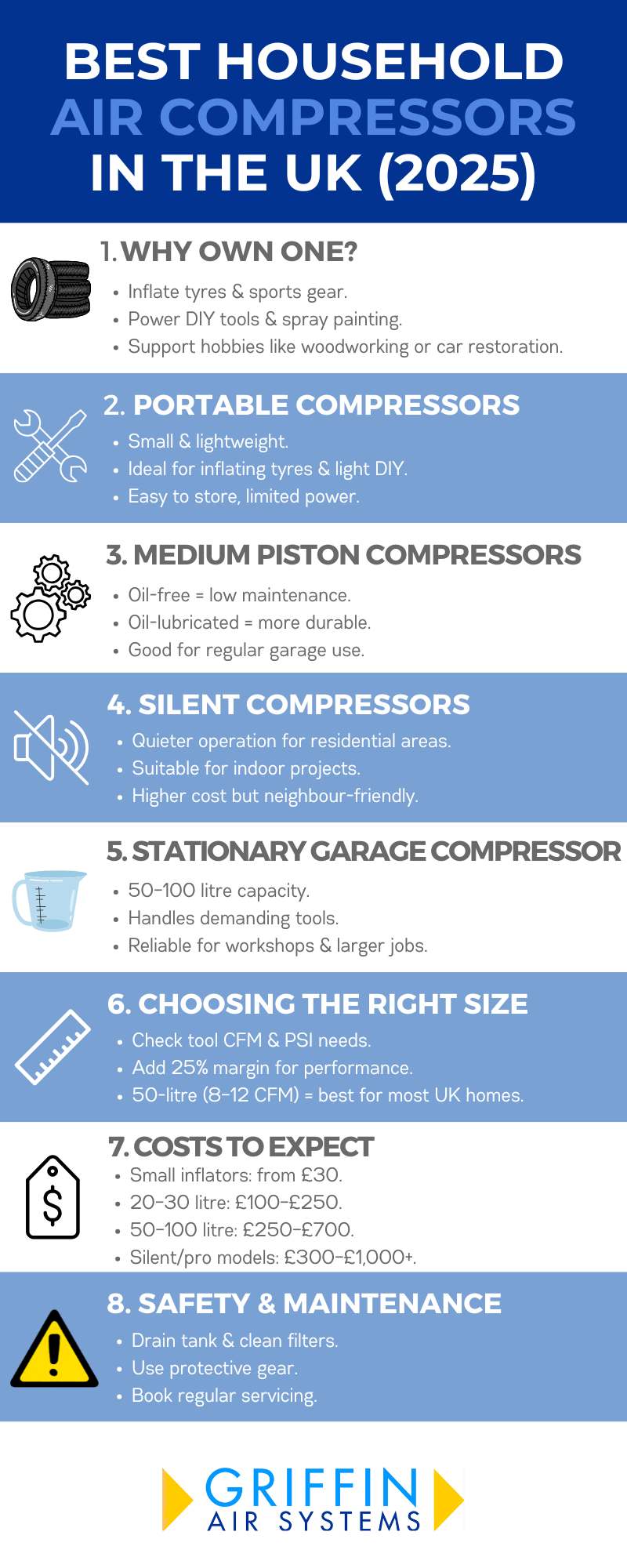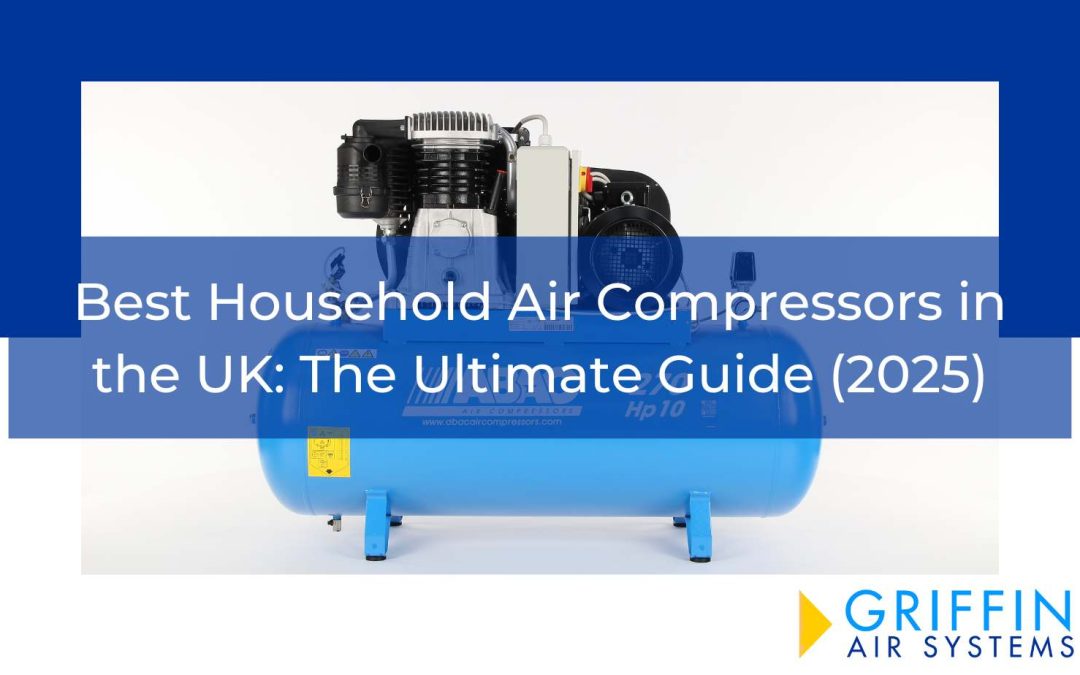At Griffin Air Systems, we have been supplying, installing and maintaining compressed air systems across the UK for more than 30 years. While much of our work is with commercial and industrial clients, we are seeing a steady rise in interest from homeowners. More people are realising that owning an air compressor at home can save time, cut costs and make a wide range of jobs simpler.
If you have ever wondered what type of household air compressor might suit you best (or even whether it is worth having one at all) this guide covers everything you need to know. From choosing the right size and type, through to costs, safety and servicing, here is our expert overview.
- Why Own an Air Compressor at Home?
- Types of Household Air Compressors
- What Size Air Compressor Do I Need for Home Use?
- Best Air Compressors for Home Garages
- How Much Does a Household Air Compressor Cost?
- Is it Worth Owning a Household Air Compressor?
- Using an Air Compressor Safely at Home
- Why Choose Griffin Air Systems?
Why Own an Air Compressor at Home?
The main reason many homeowners invest in a compressor is convenience. A compact household unit can take care of small everyday jobs from inflating car and bicycle tyres, blowing up footballs or even powering a staple gun. What begins as a handy piece of kit for odd jobs often becomes central to larger projects too.
DIY enthusiasts find compressors invaluable for running nail guns, which makes furniture building or home repairs much quicker. For anyone tackling decorating, spray painting with a compressor delivers a finish that brushes and rollers rarely match. In garages, compressors can power impact wrenches and grinders, turning what might otherwise be slow or strenuous work into something far easier.
Even beyond maintenance and DIY, compressors are useful for hobbies. Woodworking and car restoration enthusiasts benefit from the reliable airflow they provide, while artists and modellers often use them for precision airbrushing.
Types of Household Air Compressors
When choosing a household compressor, it is easy to be overwhelmed by the options. At Griffin Air Systems, we encourage customers to start with what they actually want to achieve. Broadly speaking, most domestic users will be choosing a product from the following four categories.
-
- Portable compressors are the smallest and lightest option. They are ideal if your main priority is inflating tyres or carrying out very light DIY tasks. They are simple to use and store, but lack the power for continuous or heavy-duty applications.
- Medium piston compressors are the next step up and come in oil-free or oil-lubricated designs. Oil-free models are straightforward and low maintenance, while oil-lubricated types offer more durability, particularly if you expect to use them heavily in a garage.
- Silent compressors are popular in residential settings where noise is a concern. Although more expensive, their quieter operation makes them practical for indoor work or use in areas close to neighbours.
- Finally, stationary garage compressors provide larger capacities – typically 50 to 100 litres – and are better suited to more demanding tools. These models deliver a steady supply of air and are a good fit for homeowners who want to take on more substantial projects.
What Size Air Compressor Do I Need for Home Use?
This is a common question, and the answer depends on the tools you plan to use. The two key specifications are PSI (the pressure a compressor can deliver) and CFM (the airflow volume).
Every pneumatic tool has a stated requirement, usually written as a CFM value at a certain PSI. To select the right compressor, look for the tool with the highest demand and then add a margin of at least 25 per cent. This ensures the compressor is not pushed to its limits every time you use it.
For example:
- A finish nailer might need only 2–3 CFM at 90 PSI.
- An impact wrench typically requires around 5–6 CFM.
- A spray gun may demand 10–15 CFM continuously.
If you only want to inflate tyres or run small tools occasionally, a portable compressor will be fine. If you want to spray paint or use multiple tools at once, you will need something larger. For most UK households, a 50-litre compressor producing 8–12 CFM is a sensible choice, striking a balance between size, power and cost.
Best Air Compressors for Home Garages
Home garages are where we see the most demand for household compressors. If you are setting up a workshop, you need a model that will handle a variety of tools without being excessive. In most cases, a 50–100 litre tank is ideal. Oil-free compressors are convenient for lighter use, but for heavier or more frequent work an oil-lubricated piston compressor is likely to give you better long-term value.
Noise levels are also worth considering. If you are working in a residential area, a quieter model will make your projects more comfortable and keep the peace with neighbours. At Griffin Air Systems, we often advise customers to bring along a list of their tools so that we can recommend the most suitable model for their setup.
How Much Does a Household Air Compressor Cost?
Prices vary depending on capacity, brand and design, but to give a general picture:
- Small inflators suitable for tyres or sports equipment start from around £30.
- Entry-level 20–30 litre compressors are usually £100–£250.
- Mid-range 50–100 litre models fall between £250 and £700.
- Silent or specialist models start at around £300 and can rise to £1,000 or more.
- Larger professional garage systems typically cost £1,500 upwards.
If you only need a compressor for a short-term project, hiring one may be more practical. At Griffin Air Systems, we provide both hire and leasing options alongside sales. This means you can test whether a compressor suits your needs before committing to ownership.
Is it Worth Owning a Household Air Compressor?
For households that will use it regularly, the benefits of owning a compressor are clear. You save time, reduce reliance on batteries, and gain access to a wide range of new tools. Over the years, the savings in convenience and performance often outweigh the upfront investment.
If, on the other hand, you only need a compressor occasionally, hiring may make more sense. We often advise customers to weigh up how often they expect to use it, and we are always happy to talk through the costs and benefits of both approaches.
Using an Air Compressor Safely at Home
Like all powerful tools, compressors need to be used responsibly, here is how:
- Never direct compressed air towards yourself or others
- Only use hoses and fittings designed for the pressure your machine produces
- Always drain the tank to prevent rust
- Wear protective glasses and hearing protection when appropriate
- Place the compressor on a stable surface with good ventilation
Simple checks like these make compressors much safer and more reliable in the long run.
Maintaining a Household Compressor
Even small household compressors benefit from regular maintenance. If your compressor is in frequent use, draining the condensate daily will prevent moisture from damaging the tank. Oil-lubricated models require occasional top-ups, and filters should be cleaned or replaced to keep airflow consistent. It is also wise to check hoses and fittings for signs of wear, as leaks affect both performance and safety.
Why Choose Griffin Air Systems?
Griffin Air Systems has over 30 years of experience supplying, installing and maintaining compressors across the UK. Based in Glasgow, we provide nationwide support and are members of the British Compressed Air Society. Our engineers are manufacturer-trained, and we provide sales, servicing and hire under one roof, making us a trusted choice for both businesses and households.

FAQs
What size air compressor is best for a home garage?
For most garages, a 50–100 litre compressor with an output of 8–12 CFM provides the right balance between power and practicality.
How much does a household compressor cost?
Prices range from £30 for small inflators to more than £700 for mid-range garage units. Specialist and professional models cost more.
Is owning a household air compressor worthwhile?
Yes, if you will use it often. It saves time, improves results and opens up a range of tools. For one-off jobs, hiring may be more cost-effective.
What maintenance is needed for an air compressor?
Drain the tank, keep filters clean, check the oil where applicable and book an annual service.
Secure Your Home Air Compressor Today with Griffin Air Systems
If you are looking for the best household air compressor in the UK, our team can help. We can recommend the right system for your needs, explain whether buying or hiring is more suitable, and provide ongoing support to keep your compressor in top condition.

